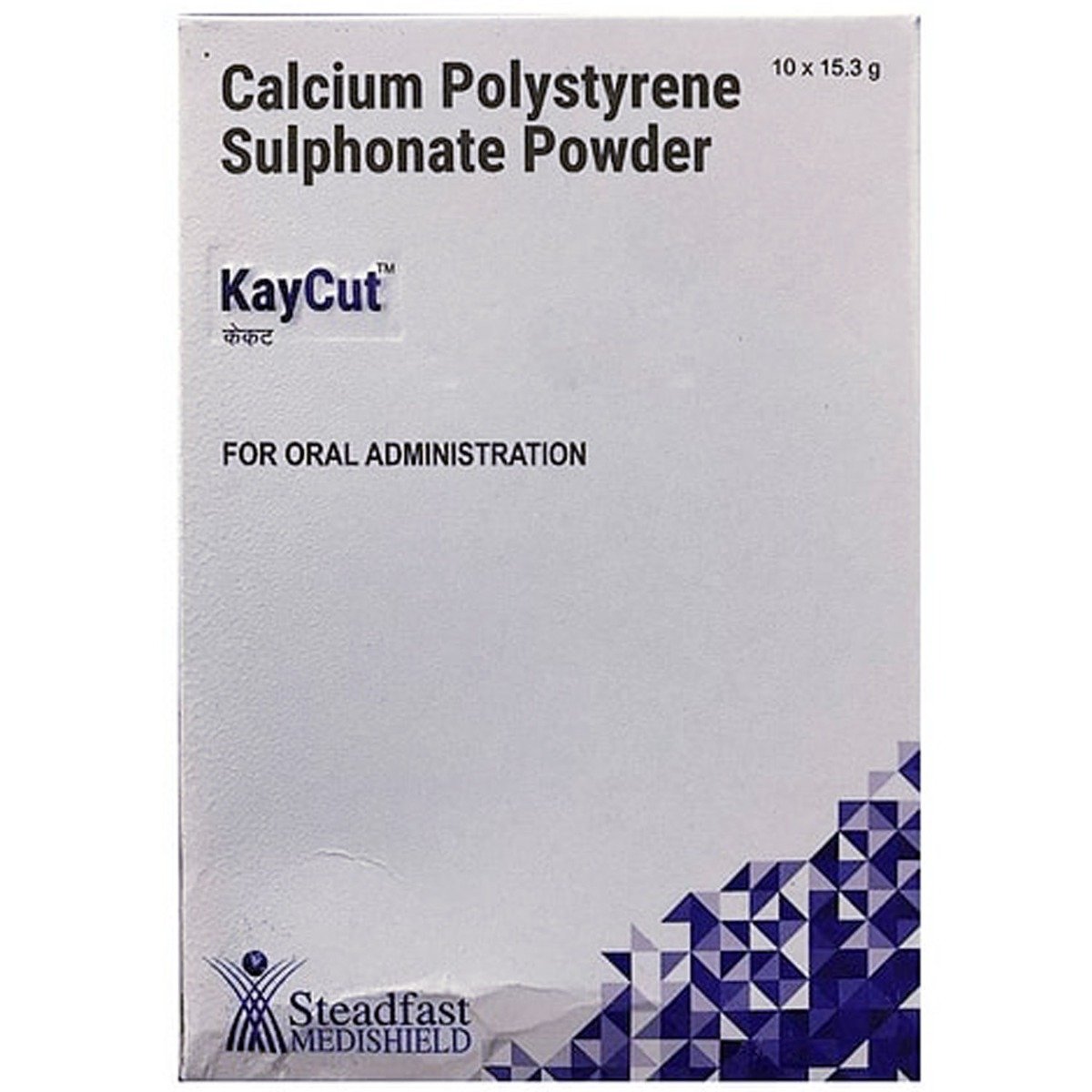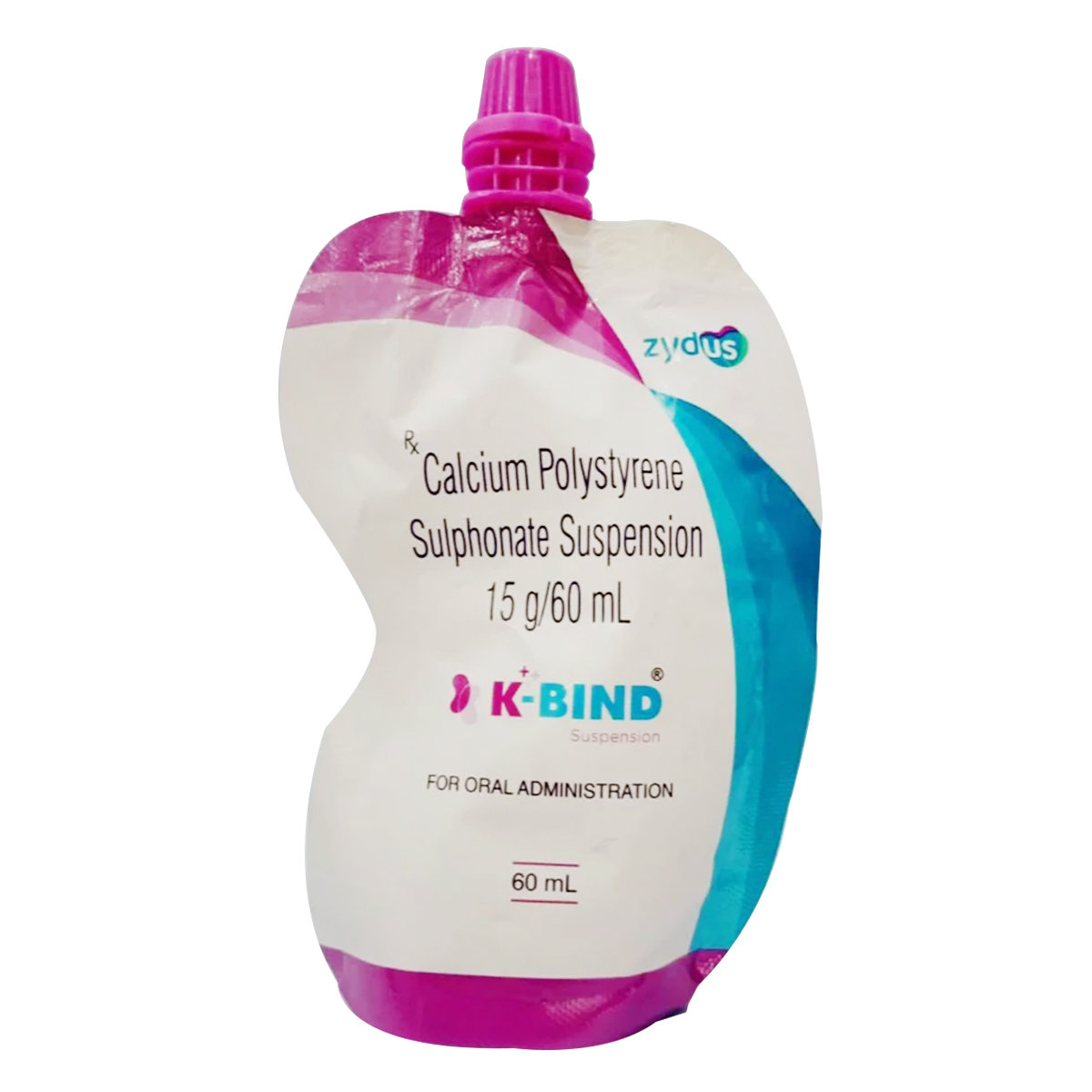Calcium Polystyrene Sulphonate
About Calcium Polystyrene Sulphonate
Calcium Polystyrene Sulphonate belongs to a group of medications called 'ion exchange resins'. It is used to treat something called 'hyperkalaemia'. It is used in patients with kidney problems and on dialysis. Hyperkalaemia (High Potassium) is a medical problem where you have too much potassium in your blood. Your body needs potassium. It is a key vitamin that may be found in various foods. Potassium aids in the proper functioning of your nerves and muscles, including your heart. Unfortunately, having too much potassium in your blood might be dangerous. It has the potential to cause major cardiac issues.
Calcium Polystyrene Sulphonate contains calcium polystyrene sulphonate, which is administered to decrease potassium's blood levels in the body, reducing the risk of 'hyperkalaemia' due to high potassium levels. It works by eliminating excess potassium from your system in order to restore your levels to normal.
Calcium Polystyrene Sulphonate is administered by a healthcare professional. Do not self-administer this medicine on your own. You should complete the course of the treatment as per the doctor's advice based on blood tests results. In some cases, you may experience Hypokalaemia and hypocalcaemia, muscle cramps, feeling tired, having muscle weakness, cramps or a change in heart rate. Most of these side effects of Calcium Polystyrene Sulphonate do not require medical attention and gradually resolve over time. However, if the side effects persist or worsen, please consult your doctor.
If you are allergic to Calcium Polystyrene Sulphonate or any other medicines, please tell your doctor. If you are pregnant or breastfeeding, think you may be pregnant, or plan to have a baby, ask your doctor or pharmacist for advice before using this medicine. The dose is also worked out for children according to how much the child weighs. Children and babies must be given a suitable dose. Children and newborns may experience severe constipation if too much is given. While you are taking this medicine, your doctor may perform routine blood tests on you. This is done to determine the quantities of salts in your blood, such as potassium, sodium, calcium, and magnesium.
Uses of Calcium Polystyrene Sulphonate
Medicinal Benefits
Calcium Polystyrene Sulphonate belongs to a group of medicines called 'ion exchange resins'. Calcium Polystyrene Sulphonate contains calcium polystyrene sulphonate, which is administered to decrease potassium's blood levels in the body, thereby reducing the risk of 'hyperkalaemia' due to high potassium levels. It works by eliminating excess potassium from your system in order to restore your levels to normal.
Directions for Use
Storage
Side Effects of Calcium Polystyrene Sulphonate
- Hypokalaemia
- Hypocalcaemia
- Muscle cramps
- Feeling tired
- Confused
- Having muscle weakness
- Cramps or a change in heart rate
- Feeling sick
- Being sick
- Constipation or diarrhoea
- Stomach upset
- Pain in your gut
- Loss of appetite
Drug Warnings
If you are allergic to Calcium Polystyrene Sulphonate or any other medicines, please inform your doctor. If you are pregnant or breastfeeding, think you may be pregnant, or plan to have a baby, ask your doctor or pharmacist for advice before using this medicine. The dose is also worked out for children according to how much the child weighs. Children and babies must be given a suitable dose. Children and newborns may experience severe constipation if too much is given. While taking this medicine, your doctor may perform routine blood tests on you. This is done to determine the quantities of salts in your blood, such as potassium, sodium, calcium, and magnesium. Before taking Calcium Polystyrene Sulphonate, inform your doctor about your medical history and all medications you are currently taking in order to rule out any potential side effects.
Drug Interactions
Drug-Drug Interactions: Calcium Polystyrene Sulphonate may interact with medicines used to treat Gastroesophageal Reflux Disease (e.g. pantoprazole, esomeprazole) and a mineral supplement (e.g. zinc sulfate).
Drug-Food Interactions: Avoid the consumption of alcohol while taking Calcium Polystyrene Sulphonate.
Drug-Disease Interactions: Inform your doctor if you have hypokalemia (refers to a lower than normal potassium level in your bloodstream), sodium load (rise in serum sodium concentration), and obstructive bowel disease (A gastrointestinal condition in which digested material is prevented from passing normally through the bowel).
Drug-Drug Interactions Checker List:
Safety Advice

Alcohol
cautionYou are recommended not to consume alcohol along with Calcium Polystyrene Sulphonate to avoid unpleasant side effects.

Pregnancy
cautionThere is limited information available on using Calcium Polystyrene Sulphonate in patients with pregnant women. Your doctor will weigh the benefits and potential risks before prescribing them to you. Please consult your doctor.

Breast Feeding
cautionThere is limited information available on using Calcium Polystyrene Sulphonate in patients with pregnant women. Your doctor will weigh the benefits and potential risks before prescribing them to you. Please consult your doctor.

Driving
safe if prescribedCalcium Polystyrene Sulphonate has no or negligible impact on the ability to drive or use machines.

Liver
cautionIf you have a history or evidence of any liver-related diseases, please inform the doctor before taking medicine. Your doctor will weigh the benefits and potential risks before prescribing Calcium Polystyrene Sulphonate.

Kidney
cautionIf you have a history or evidence of any kidney-related diseases, please inform the doctor before taking medicine. Your doctor will weigh the benefits and potential risks before prescribing Calcium Polystyrene Sulphonate.

Children
safe if prescribedCalcium Polystyrene Sulphonate can be given safely to children under the supervision of a child specialist. The dose is worked out according to how much the child weighs.
Habit Forming
Special Advise
- While using this medication, your doctor may perform routine blood tests. This determines the levels of salts in your blood, such as potassium, sodium, calcium, and magnesium.
Patients Concern
Disease/Condition Glossary
Hyperkalaemia: Hyperkalaemia (High Potassium) is a medical condition in which your blood contains too much potassium. Your body requires potassium. It's a vital nutrient that can be found in various foods. Potassium aids the proper functioning of your nerves and muscles, including your heart. Moreover, having too much potassium in your blood might be dangerous. It has the potential to cause major heart problems.
FAQs
Calcium Polystyrene Sulphonate contains calcium polystyrene sulphonate, which belongs to a group of medicines called 'ion exchange resins. It is used to treat a medical condition known as 'hyperkalaemia.' This occurs when your blood has excessive potassium. It works by eliminating excess potassium from your system in order to restore your levels to normal.
The most common cause of genuinely high potassium (hyperkalemia) is a kidney problem, such as acute kidney failure. Kidney disease is chronic.
Potassium is an essential electrolyte required for various vital functions in our body. However, high potassium levels may lead to complications such as muscle cramps, pain, difficulty breathing, nausea, tiredness, chest pain, and even death.
No, it is a prescribed medication for preventing specific medical conditions such as treating hyperkalaemia. Taking this medication on your own can cause unwanted side effects.
Calcium Polystyrene Sulphonate may interact with medicines used to treat Gastroesophageal Reflux Disease (e.g. pantoprazole, esomeprazole). So, it is recommended not to take Calcium Polystyrene Sulphonate and antacids medications same time. If necessary, a time gap of 2hours in between two medicines is advisable.
Depending upon the severity of your medical condition, your doctor may prescribe Calcium Polystyrene Sulphonate to you daily for a specific duration. However, do not take it endlessly on your own without a doctor's advice.








